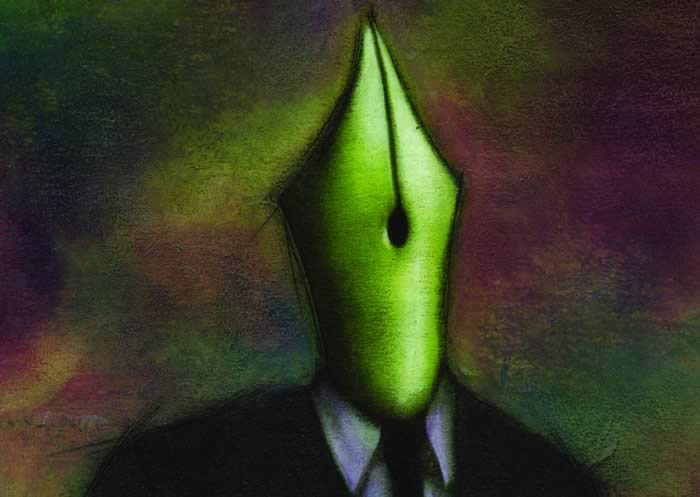
© Corbis
Practicing what they preach
by Mark Gola
Writing is an instrument played by all. It is a universal method of communication that enables us to express thought, provide direction, document fact, or channel imagination. Some relish the craft, and others despise it, but regardless of talent or desire, it is an essential skill encountered in every field of study and profession. As English novelist E.M. Forster once said, “How do I know what I think until I see what I say?”
At The College of New Jersey, students who pull open the doors of Bliss Hall gain entrance to opportunity. Roving the hallways and holding court in classrooms are not only English professors, but writing practitioners. A stream of published poets, biographers, and historical writers saturate the College ’s Department of English, and as many would argue, those who practice what they preach are best equipped to impart wisdom pertaining to their trade.
“Almost every student at TCNJ comes through our doors,” said David Blake, associate professor of English. “Nearly all of the English department classes are open to everyone, so the professors can really have a profound effect on the writing skills of all students at the College. ”
“It’s terrific to see how many English department professors are engaged in writing projects. We ’ve been given the freedom to explore, in order to enrich the classroom experience. It ’s very impressive,” Blake said.
It’s not just the number of English professors at TCNJ who are currently working on books (too many to mention for this article), but also the diversity of publications they ’re producing. Associate Professor Catie Rosemurgy is completing her second poetry collection. Professor Michael Robertson is penning a biography on Walt Whitman. Professor Ellen Friedman is documenting her family history, a story of Holocaust victims and survivors from Warsaw, Poland. Assistant Professor Donna Shaw is recounting the true story of hemophiliacs who were infected by the AIDS virus during the 1980s. The collective writings by English department professors in subject and style are eclectic. The professors ’ depth of knowledge and experience rests at the fingertips of TCNJ students.
English department classes are open to everyone, so the professors can really have a profound effect on the writing skills of all students at the College.
“I have so much respect for our faculty for the energy and passion they bring to teaching, ” says department Chair Jo Carney. “They love teaching and writing. We want our faculty to serve, as models for students, and by continuing to explore writing projects, they promote lifelong learning. Writing is not a skill that you suddenly ‘get’ or perfect. It’s constant work and practice.”
Rosemurgy garnered national recognition earlier this year for her literary works. She was one of just 50 recipients nationwide of the 2007 Literature Fellowship in Poetry, courtesy of the National Endowment for the Arts. Rosemurgy continues to flourish, producing creative work as she completes her compilation of poems titled The Stranger Manual. The poems center around a persona named Miss Peach, whose character is fundamentally unreliable. “She doesn’t stay the same for very long, not in terms of personality, world view, age, or physical shape, ” explains Rosemurgy. “In this way, she’s an exaggerated version of ourselves.” The poems also look at the town in which Miss Peach lives and look at the issues of belonging and community from a skeptical viewpoint. “In the book, I’m interested in outsider status, how one becomes an outsider, and what’s powerful about it.”
Jess Row is a fresh face at TCNJ, but a rising star in the literary ranks. Row was named one of the “Best of Young American Novelists” by Granta, a famed literary magazine. He has also written two book reviews for The New York Times “Sunday Book Review” section, including a cover review this past September. Row is currently working on a novel primarily set in Laos during the Vietnam War titled Lamentations. He is also writing a new collection of short stories called The Answer. “These stories are all about the aftermath of September 11th, sometimes in direct and sometime oblique ways, ” he explains. “They’re bound together by a concern about the connection between intimate betrayals and misunderstandings and the abstractions that lead to violence. ”
“There are often opportunities for professors to bring their outside work into the classroom, which enhances the learning for students, ” explained Carney. “But what may have an even greater teaching impact is the indirect influence their ‘works-in-progress’ bring. Because they’re practitioners, the professors feel the pain of the students when confronted by edits, revisions, and criticisms. They ’re going through it as well. When those feelings can be shared with the students, it ’s a little less intimidating to them.”

Shaw is utilizing research and investigative and writing skills to construct her project. Her work-in-progress book, tentatively titled An Act of God, recounts the true story of how thousands of hemophiliacs in the United States were infected with the AIDS virus by tainted blood-clotting products, primarily in the 1980s. “At least nine of out 10 hemophiliacs in this country were infected, making it one of the most deadly medically induced epidemics in our history, ” Shaw states. “The book recounts the struggles of the hemophilia community in its search for justice against a backdrop of scientific, government, and business decisions that contributed to the tragedy.” Shaw is collaborating on the project with a lawyer from New Brunswick, NJ.
Having a Walt Whitman expert at the College is a great asset. To have two of the most renowned Whitman authorities in the country stationed in Bliss Hall is a treasure. Blake and Robertson codirected Walt Whitman’s Leaves of Grass: The Sesquicentennial Symposium, held on campus during TCNJ’s Sesquicentennial in 2005. They are also are coediting a book, due out this spring, titled Walt Whitman: Where the Future Becomes Present.
Robertson has a second Whitman tome due out at that time called Worshiping Walt: The Whitman Disciples. It’s a group biography of the Whitman disciples—a fascinating group that includes both the superintendent of a Canadian insane asylum and a distinguished English woman of letters, both Oscar Wilde and an architect ’s assistant from Bolton, England. The book sheds new light on how Whitman was received in his lifetime and how he spoke to the religious needs, political aspirations, and erotic desires of men and women in the late-Victorian era. In his disciples ’ fervent eyes, Whitman was variously an ideal husband, a promoter of same-sex passion, or a socialist saint. For all followers, however, he was principally a great religious figure, author of a new poetic scripture, and prophet of a modern, liberal spirituality destined to supplant outmoded creeds.
Because they're practitioners, the professors feel the pain of the students when confronted by edits, revisions, and criticisms. They're going through it as well. When those feelings can be shared with the students, it's a little less intimidating to them.
Blake, who authored Walt Whitman and the Culture of American Celebrity, published by Yale University Press in 2006, is now writing a book about the history of politics and celebrity in the United States, from the 19th-century circus clown Dan Rice (who briefly ran for president after the Civil War) to Arnold Schwarzenegger. The book explores our attraction to celebrity candidates and why we seem to value celebrity endorsements. It combines political theory, communications, film studies, history, and literary criticism.
“In a good intellectual community, people get a lot of feedback from each other,” Carney notes. “David Blake and Michael Robertson are a perfect example. Two of the most prominent Whitman scholars in the country are a source of tremendous encouragement to each other, and they can also encourage and motivate other people.”
The Seven is a book-length ethnographic account of a family’s experience during the Holocaust, based on interviews conducted by Friedman. “The project is based on the experiences of my family during the Holocaust. My maternal and paternal families are Holocaust victims and survivors from Warsaw, Poland. Those who survived did not go to concentration camps, but survived in the U.S.S.R., where, in fact, I was born. Fewer than 10 percent of the Polish Jews survived Nazi murder, and, of those, most survived by escaping to the U.S.S.R. This story of Jewish survival is less familiar than the story of concentration and death camps. ”
Friedman’s research began 23 years ago, when she interviewed her mother, father, and two uncles. Over the past three years, she ’s interviewed additional relatives and compiled over 75 hours of audio tape. She has plans to write a book that weaves together the shocking experiences of her family members and to present a treatment addressing the lesser-documented Polish Jews who survived in the Soviet Union.
Writing is similar to other crafts in that some have a greater aptitude for it than others. But there are many more work habits employed during writing projects than simply sitting down and punching keys. Research, conducting interviews, organizing notes, outlining a plan, and fact-checking are vital components of good writing that apply to all major fields of study and professions. The professors within the English department at TCNJ may not train every student to become the next Henry David Thoreau, but they will convey wisdom that transcends scripting words on paper.

“Teaching is not an afterthought here. We love our students,” expressed Carney, who teaches courses in Shakespeare, early modern British literature, and children ’s and adolescent literature. “Everyone has their own teaching style, but when you walk into a class, it’s interactive. They’re not lecture-based classes, but rather discussion-based. Again, we want our professors to be models to the students. If the students see their teachers as scholars who continue to learn and improve, we --hope that they leave here with more questions than answers.”


